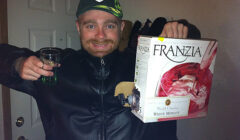The Art of Business: Cheers to the Creator of Box Wine

“I have done much more good through my company than I ever did through my philanthropy,” said Art Ciocca, a business leader and benefactor America should have known better than it did. He passed away on Dec. 18 at the age of 84, yet his belief that entrepreneurship is the most powerful driver of human progress must live on.
Ironically, Art’s name is most likely to endure through his philanthropy, especially his funding of “Ciocca Centers” of Principled Entrepreneurship at The College of the Holy Cross, Santa Clara University, and The Catholic University of America, where I teach. Yet Art’s impact on society is most clearly felt in the innovations he shepherded as co-founder of The Wine Group, especially box wine. Whereas his philanthropy has helped tens of thousands, his entrepreneurship has served hundreds of millions.
Art did not invent box wine, but he did introduce it to society. He saw entrepreneurship as more calling than career, and he pursued it with all his heart. He started his company by taking out multiple mortgages and spending his life’s savings, only to discover that he couldn’t compete with bigger winemakers. His best-laid plan to provide affordable, quality glass-bottled wine wasn’t viable. But rather than give up, Art decided to create a completely new market altogether.
The search led Art to an Australian vintner who’d experimented with putting wine in plastic bags. The vintner couldn’t make it work, but Art thought he could, and his company depended on it. By replacing glass bottles with plastic bags in a cardboard box, he could save huge sums on production costs, while also offering bigger volumes of five liters instead of the typical glass-bottle maximum of three or four. No one else was doing it, and in Art’s mind, that meant he had to.
It was easier said than done. Art personally went through twenty-plus iterations of his new product, desperately trying to stop the rips and leaks that flooded grocery stores and sparked furious calls to the sales department. He refused to give up, even after his team begged him to stick with traditional bottled wine. He saw what others didn’t: that customers would see tremendous value in this new creation.
By Andreas Widmer









